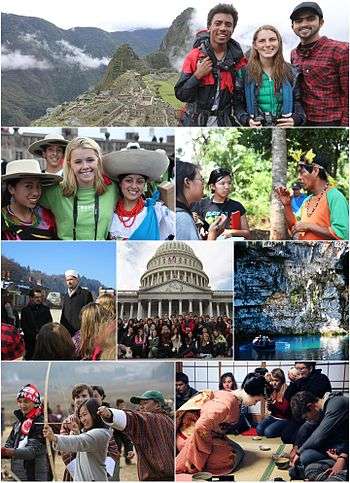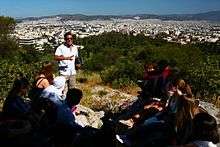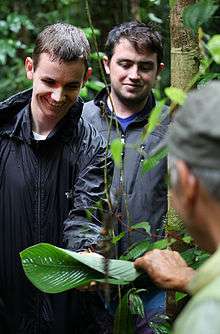Think Global School
| THINK Global School | |
|---|---|
 Top to bottom, left to right: THINK Global School (TGS) visits Machu Picchu, Peru; TGS in Quito, Ecuador; Discussing conservation issues with a Guarani tribe member in Misiones, Argentina; Islam discussion with an Imam in Bosnia; TGS in Washington DC; recreating The Odyssey in the Melissani Cave, Greece; Archery lessons in Thimphu, Bhutan; Tea with a maiko in Kyoto, Japan. | |
| Information | |
| School type | Independent, boarding, secondary School, co-educational |
| Opened | 2010 |
| Founder | Joann McPike |
| Head of school | Jamie Steckart |
| Teaching staff | 20 |
| Grades | 10-12 |
| Enrollment | 57 |
| Average class size | 10 |
| Student to teacher ratio | 4:1 |
| Medium of language | English |
| Accreditation | Western Association of Schools and Colleges |
| Tuition | US $85,500, sliding scale |
| Website |
thinkglobalschool |
THINK Global School is an independent high school that travels the world, giving students the opportunity to study in twelve different countries over the course of three years. The school is non-profit, co-educational, and non-denominational. The school was created by travel photographer Joann McPike, who contributed the founding donation.
During the 2010-11 school year, the students studied in Stockholm, Sweden; Sydney, Australia; and Beijing, China. During the 2011-12 school year, they studied in Cuenca, Ecuador; Chiang Mai, Thailand; and Berlin, Germany. The 2012-13 school year included a fall term in Buenos Aires, Argentina; a spring term in Boston, United States; and a two-week intersession in Bhutan. The 2013-14 school year included a fall term in Hyderabad, India, a spring term in Hiroshima, Japan, and a two-week intersession in Tanzania. The 2014-15 school year consisted of three terms: the first taking place in Auckland, New Zealand, followed by terms in Puntarenas, Costa Rica and Athens, Greece. The 2015-2016 school year includes a return to Stockholm, a term in Sarajevo, Bosnia and Herzegovina, and will culminate in Florence, Italy. The 2016-17 school year will take place in Peru, Morocco, and Canada.
The school was granted full authorization as an IB World School by the International Baccalaureate Organization in April 2012. THINK Global School graduated its first class of students on May 31, 2014. The class of 2015 had a 100% IB pass rate. In 2016, THINK Global School received a five-year renewal of its accreditation by the Western Association of Schools and Conferences.
Mission
The school's mission is "to challenge learners, through firsthand experiences of global travel, to become compassionate individuals who are curious and knowledgeable about the world and motivated to effect meaningful change. To guide us on our journey and help us achieve our goals, we follow a set of core values and promises gathered from nations around the world.."[1]
Non-profit status
The school is a U.S.-registered 501(c)(3) non-profit entity and has earned the Guidestar Exchange Seal, an award given to non-profits demonstrating a commitment to transparency.[2]
Language of instruction
The school's core academic program is taught in English, but the curriculum also includes classroom study of Spanish. Moreover, students are expected to acquire a basic vocabulary in the language of each trimester’s host city.
Curriculum
The school became an IB World School in April 2012.[3] Its curriculum was guided by the IB Diploma Programme, with students taking the IB examinations prior to graduation at the end of their fourth year. Beginning in the 2017-18 school year, THINK Global School introduced its new Changemaker Curriculum,[4][5] in combination with the AP Capstone Diploma and began phasing out the IB. All graduating students also earn high school diplomas accredited by the U.S.-based Western Association of Schools and Colleges.[6]
Courses
The curriculum for Grade 10 is based on the IB Middle Years Programme. The curriculum for Grades 11 and 12 follows the standards of the IB Diploma Programme.
Grades 10 courses:


- English (World Literature)
- Global Studies (Anthropology, Current Events, Geography, History)
- Science (Biology, Chemistry, Physics)
- Math (Statistics, Geometry, Algebra, Pre-Calculus)
- World Languages (Spanish 1, 2, 3)
- Visual Arts (Photography, Film, Drawing, Painting)
- Physical Education
- newMedia Lab
Grades 11-12 courses:
- Theory of Knowledge
- World Literature SL/HL
- Spanish SL/HL
- Spanish Ab Initio SL
- Mandarin Ab Initio SL
- History SL/HL
- Geography HL
- Economics SL/HL
- Environmental Systems and Societies SL
- Information Technology in a Global Society SL/HL
- Business and Management SL/HL
- Psychology SL/HL
- Philosophy SL
- Social and Cultural Anthropology SL/HL
- Environmental Systems and Societies SL
- Biology SL/HL
- Mathematical Studies SL
- Mathematics SL/HL
- Visual Arts SL/HL
- Film Studies SL
weXplore program
In addition to traditional classroom courses, the curriculum includes field research, guest lectures, and workshops in each host city, planned in coordination with the school's subject area faculty. These activities are collectively known as "weXplore."[7]

Sample weXplore activities:
- Studied Sweden's Sami culture in Lapland, Sweden
- Recreated Homer's The Odyssey by sailing across Greece
- Sumo wrestling in Tokyo, Japan
- Wagah border ceremony in Amritsar, India
- Tiger's Nest Monastery in Bhutan
- Conservation issues at Iguazu Falls in Misiones, Argentina
- Biology lessons in the Galapagos Islands
- Muay Thai boxing exhibition in Bangkok, Thailand
Sample guest speakers:[8]
- Noam Chomsky
- Iran's Crown Prince Reza Pahlavi
- Bhutan's Prime Minister Tshering Tobgay
- Hans Rosling
References
- ↑ https://thinkglobalschool.org/about/mission-values/
- ↑ http://www.guidestar.org/organizations/42-1767394/tgs-think-global-school.aspx
- ↑ https://thinkglobalschool.org/think-global-school-receives-ib-accreditation/
- ↑ "The radical rethink of THINK Global School | THINK Global School". THINK Global School - The World’s First Traveling High School. 2017-01-24. Retrieved 2018-05-19.
- ↑ "The Changemaker Curriculum | THINK Global School". THINK Global School - The World’s First Traveling High School. 2016-08-09. Retrieved 2018-05-19.
- ↑ https://thinkglobalschool.org/academics/curriculum-overview/
- ↑ https://thinkglobalschool.org/academics/wexplore/
- ↑ https://thinkglobalschool.org/academics/guest-speakers/
External links
- THINK Global School

- SVT News on THINK Global School
- YBC - Young Business Creatives (Stockholm Host School)
- Sydney: MLC (Sydney Host School)
- Beijing BISS International School (Beijing Host School)
- THINK Global School Presents Hans Rosling
- "The World's First Global Mobile High School" By Katherine Gustafson
- "Sweden to host first Think Global School trimester" By Marcus Oscarsson
- "Cameron Becomes A Citizen of the World" By The South Coast Register
- "Life-changing journey for student" By The Press
- "Hiroshima International School and THINK Global School students mix it up in Multiculturalism 101" By Louise George Kittaka
- "The world as a classroom" By Amelia Thomas
- "THINK Global School receives five year WASC accreditation"